Home |
Contents |
Photos |
News |
Reviews |
Store |
Forum |
ICI |
Educators |
Fans |
Contests |
Help |
FAQ |
Info


Kill Those Towelheads!
(9/18/01)
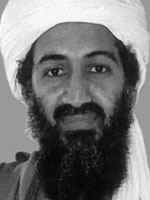
A decent man...enters a battle gravely,
with sorrow and with great compassion,
as if he were attending a funeral.
Lao Tzu, Tao Te Ching
War is at best barbarism....Its glory is all moonshine. It is only those who have neither fired a shot, nor heard the shrieks and groans of the wounded who cry aloud for blood, more vengeance, more desolation. War is hell.
William Tecumseh Sherman, address at the Michigan Military Academy, June 19, 1879
*****
Continuing the analysis of the 9/11/01 terrorist attack on America....
From the LA Times, 9/13/01:
AMERICA ATTACKED: A NATION MOURNS
America: Stunned, Saddened and Now Ready for Revenge
By JENIFER WARREN and TOM GORMAN, TIMES STAFF WRITERS
Sales of American flags skyrocketed. Donors overwhelmed blood banks. And all across the land, in sleepy Farm Belt barber shops and jangling Las Vegas casinos, at military recruitment stations and reopened shopping malls, Americans talked angrily Wednesday of retaliation, brutal and swift.
Many people described how their emotions had evolved over the last 24 hours. The initial shock and fear brought on by incomprehensible televised imagery—hijacked airliners plunging into the World Trade Center, the Pentagon ablaze—had given way to hard rage and a hunger for vengeance.
.
.
.
In various media polls since the attacks, respondents have expressed by whopping margins their support for a military response—a sentiment that was repeated again and again in interviews Wednesday across the United States.
In Fulton, Mo., barber Robert Fleming said vengeance was a common theme in his customers' conversations: "Most everybody is willing to put a bullet in someone's head once they find the person who did it."
"I'm angry," fumed Joan Renshaw, a grandmother in suburban Atlanta. "I'm hoping we wipe these people out, and if we need to, wipe out the country that is hosting [them]. Just get rid of them all. The thing is we just need to stop all this. If we make a statement and bomb that country to smithereens, it might scare a lot of the other terrorists off."
Comment: It also might kill thousands of innocent people—mothers and children, even—but never mind.
Amber Hagenback, who sells yo-yos and sun visors from a cart outside Las Vegas casinos, said she had encountered some New Yorkers right after the attack shuffling along the sidewalk with "blank faces. We hugged. I had to show them some love."
On Wednesday, though, the 25-year-old made clear that tender mercies would not extend to the perpetrators—or to any country that might have sheltered them.
"I'd like to see an angry resolve," she said, "to end this terrorism, quickly and forcefully. We shouldn't lollygag and delay. Justice should not take precedence over vengeance.
"We ought to warn the country that we're going to bomb them, so the innocent people can get out—because we're above killing innocents—then we should turn their country into a glowing desert."
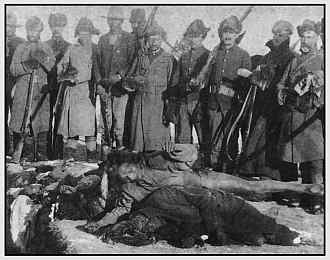
We don't kill innocents? That would be news to all the innocents we've killed—if they were alive to hear it.
If you keep reading, you'll learn we've killed many innocents abroad: in Iraq, Sudan, Central America, etc. We've also killed many innocents at home: victims of police brutality, anti-war protesters, union members, immigrants, Native Americans.
This mixed-up woman could be the prototypical American. She hugs complete strangers with love. She probably signs her letters with smiley faces and circles over her i's. She's so Pollyanna-ish she seems oblivious to America's bloody history.
Then she turns around and demands vengeance. Justice, the alleged goal of cowboys, superheroes, and other Americans, isn't enough for her. She wants to incinerate an entire people and the land they live on, making both as dead as the moon.
That's a true American for you. "Us against them...nice guys finish last...be a victor or be a victim."
Don't forget the camel jockeys!
More shining examples of America's values in action:
Everyone is saying that the response to these attacks must be swift and severe, but no one has been specific. Here is what we must do: We must recognize that, since 8:50 AM on the morning of September 11, a state of war has existed between the United States and the countries who sponsor, support and harbor terrorists. We already know who these countries are: they include Afghanistan, Iran, Iraq, Syria, Sudan and Libya.
Robert Tracinski, column, week of September 10-17, 2001
The time has come for the United States to make good on its past pledges that it will use all military capabilities at its disposal to defend U.S. soil by delivering nuclear strikes against the instigators and perpetrators of the attacks against the nation's political capital and the nation's financial capital.
At a bare minimum, tactical nuclear capabilities should be used against the bin Laden camps in the desert of Afghanistan. To do less would be rightly seen by the poisoned minds that orchestrated these attacks as cowardice on the part of the United States and the current administration.
To consider use of the nation's nuclear forces, in the present circumstances, cannot be brushed aside as an overly emotional response to the unknown face of terrorism. To begin with, we know who that face belongs to, and we know where a goodly portion of his logistical and training capabilities are located. A series of low-level, tactical nuclear strikes in the Afghanistan desert would pose no risk to large population centers and would carry little risk of fallout spreading to populated areas.
Thomas Woodrow, Time to Use the Nuclear Option, Washington Times, 9/14/01
A suburban Atlanta police officer lost his job after sending an e-mail advocating the killing of millions of Arabs and suggesting that the United States "eliminate the entire Arab world" if terrorism continues.
Days after the Sept. 11 attacks in which hijacked planes rammed into the World Trade Center towers in New York and a wing of the Pentagon near Washington, Ray Sanford, a police crime analyst in Griffin, made the comments on an e-mail discussion list he had created for law enforcement officers.
"I think 1,000 Arabs must die for each American killed," Sanford wrote. The message also advocated starving the Afghan people to death.
LA Times, 10/5/01
We know who the homicidal maniacs are. They are the ones cheering and dancing right now. We should invade their countries, kill their leaders and convert them to Christianity. We weren't punctilious about locating and punishing only Hitler and his top officers. We carpet-bombed German cities; we killed civilians. That's war. And this is war.
Ann Coulter, National Review Online, c. October 2001
We don't do small well in this country and we should stop trying to. Countries dominated by fundamentalist Muslim clerics are orchestrating these attacks. Those governments (not the religion) need to be eliminated, just as we eliminated Nazism. If we need to draft an army of 10 million and occupy these aggressors for generations, so be it. This needs to be a large, conventional war on these barbarians, not a dogfight with their lap dog.
Gary Hall, letter, LA Times, 10/6/01
We must now use our unsurpassed military to destroy all branches of the Iranian and Afghani governments, regardless of the suffering and death this will bring to the many innocents caught in the line of fire.
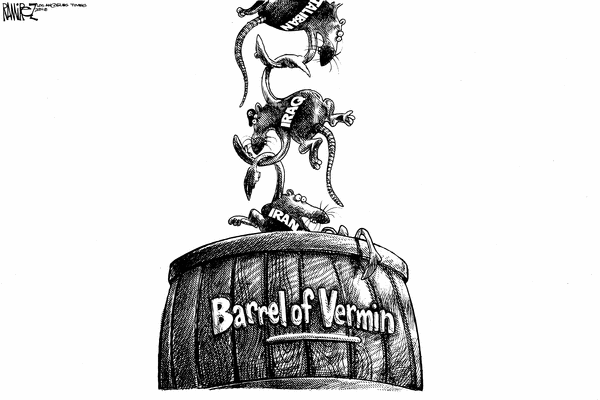
Leonard Peikoff, Fifty Years of Appeasement Led to Black Tuesday, 9/12/01
We want action. Any country or person harboring a known terrorist must face annihilation. Any person or country purposely contributing to terrorism must face extinction. It's simple. This is what American people need to hear.
David Yeagley, Indians Should Lead the Way to War, Grand Forks Herald, 9/16/01
Rialto Democratic Congressman Joe Baca said the angriest calls have been demanding an immediate military strike against "anyone from Afghanistan, Pakistan, Iran or Iraq."
Patt Morrison's column, LA Times, 9/24/01
"I hate to see some country blown all to pieces just to get a few terrorists," said 87-year-old Elmer Thornton, a farmer in Elsie, Mich. "But if it has to happen, it has to happen."
LA Times, 9/16/01
Some have said that if we, the U.S., accidentally kill civilians of other nations in our efforts to defend ourselves, then we are doing the same thing as the terrorists. This is not true. The terrorists targeted our civilians. We will be targeting the terrorists and those who harbor them. There may be some civilian casualties on their side as a result of our actions. But we cannot put their civilians ahead of our own. This is war, and we must defend ourselves.
Vik Rubenfeld, letter, LA Times, 9/13/01
Comment: I thought Nicholas Longo (Indian Comics Irregular #65) was extreme when he called for the annihilation of the countries responsible. It's good to confirm what I suspected at the time—that his views were far from unique in America's "thinking."
If Tracinski wants to go to war, I trust he'll be the first one marching into Afghanistan and taking a bullet for the good ol' US of A. If not, he's a goddamned hypocrite. As is everyone else who's willing to sacrifice our soldiers but not himself.
A few problems with Rubenfeld's "logic": For starters, the terrorists didn't target only civilians. They targeted non-civilians at the Pentagon and possibly at Camp David or the White House.
More important, people suspected of being terrorists aren't proven criminals. Even more important, people suspected of harboring terrorists aren't proven criminals. We've harbored "terrorists" as diverse as Yasser Arafat, Fidel Castro, and Menachem Begin for brief periods—not to mention dictators such as Ferdinand Marcos and the Shah of Iran. Would that justify, say, an airstrike on New York's UN building?
We can't put "their" civilians ahead of our own? Says who? If a terrorist lives next door to a civilian, does that make the civilian "theirs"? Why does this presumably innocent neighbor deserve to die?
Here's a novel thought. How about if we treat all human beings equally? Isn't that what Jesus would do? Don't Americans like "President" Bush practice what Christ preached?
Don Imus, true American: "Kill them all"
Alternate title: Big-mouthed jerk says what others are thinking.
The following posting suggests that the lust for foreign death wasn't limited to the "heat of the passion" immediately following 9/11. No, more than two months later, a prominent American could call for genocide on national radio and receive no criticism.
From a Larry King interview with shock-jock Don Imus, aired 11/17/01:
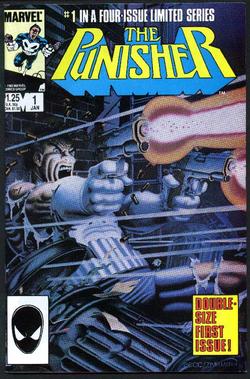
Don Imus on the Events After September 11
KING: Do you have any thoughts about fighting during a holiday like Ramadan, which is not, of course, a holiday celebrated in the Christian world, but is the major holiday in that world?
IMUS: Well, there's a whole history of them fighting during Ramadan and, you know, attacks on Israel during — no, I don't have any — you know, they shouldn't have started this. They're worried about — we should drop more bombs during this rama-lama-ding-dong or whatever it is.
KING: Don, it's not a rama-lama-ding-dong!
IMUS: Well whatever it's called. My position is, I mean, I know it sounds awful, but we should kill them all.
KING: What!
IMUS: We should kill all of them. And the problem is — you know, when I see people on television like Phil Donahue or some of these other people, and they have a noble idea; and that is it would be great if everybody in the world could love one another and we could all get along. And no sane person would disagree with that goal, or that philosophy.
But the truth is, that's not going to happen with these people. They already killed 6,000 of us, they want to kill the other 300 million. There's no way to reason with them. You can't reason with them. You're not going to be able to sit down and have some bigelow (ph) tea or whatever they drink and reason with them. It's just not going happen. So the next best thing to do is kill them.
America's finest seek blood too
From the LA Times, 9/12/01:
WORLD REACTION
Retaliation Rife With Risks, Hard Choices
Response: If the U.S. determines Bin Laden is to blame, it has several options, including air strikes in Afghanistan or the Mideast.
By ESTHER SCHRADER and PAUL RICHTER, TIMES STAFF WRITERS
"Once we've determined where these attacks originated from, I would not be surprised to see a reaction that was warlike," said Loren Thompson, a defense analyst at the Lexington Institute in Arlington, Va. Such retaliation might include bombing in major cities and attacks on material assets of countries considered friendly to terrorists.
In the past, the United States has prefaced most military actions with diplomatic initiatives to enlist the support of allies. The Bush administration is certain to work through diplomatic channels in this case too, although the pressure in this country for a strong military response may test the limits of U.S. patience.
Former Secretary of State Lawrence S. Eagleburger declared that "there's only one way to deal with people like this—that's to kill some of them. They need to be hit."
In an interview with CNN, former Secretary of State Henry A. Kissinger said the attack "is comparable to Pearl Harbor. And we must have the same response, and the people who did it must have the same end as the people who attacked Pearl Harbor."
Comment: What? We're going to make Afghanistan the world's second largest economic superpower, just like we did with Japan? What a reward for harboring terrorists!
Others used even stronger language. Larry Johnson, a former State Department counter-terrorism official, declared that "Bin Laden's awakened people to the need to use weapons not used before—including nuclear weapons—on Afghanistan."
"You don't launch a few missiles and make them craters and expect the problem to go away," Johnson said. If the United States doesn't respond forcefully, "the U.S. will be seen as unable to fight."

Yes, and we wouldn't want anyone to question our manliness, would we? Killing and proving our potency is more important than justice and ending the threats.
Next time we're at war war with a country such as Iraq, and a dictator such as Saddam Hussein nukes an American city with a suitcase bomb, I assume Johnson won't mind. If he thinks nukes are a legitimate weapon of war, he must be prepared to accept the consequences. Unless he's a raving hypocrite, that is.
Thompson said attacks in New York might have taken the lives of "as many people in New York today as we lost in all of the entire Korean War. The only way to prevent this in the future is to do what the terrorists did to demonstrate the consequences. We need a huge show of force that involves huge loss of material assets and lots of casualties."
Actually, there are several ways to prevent terrorism besides killing people. Try the approach Jesus would take: talking and listening with faith, hope, and charity.
But William Kincade, a professor of international relations at the American University School of International Service, was skeptical that the Bush administration would change the strategy of targeted retaliation that has marked U.S. policy against terrorists in the past.
"They'll probably just keep up the retaliation, counter-retaliation that's gone on between the U.S. and much of the Arab world for the last couple of decades," Kincade said. "They don't know that it doesn't work. That's exactly the thing that they don't understand."
"You have learned that they were told, 'Eye for eye, tooth for tooth.' But what I tell you is this: Do not set yourself against the man who wrongs you." (Jesus, Matthew 5:38-39)
Most of those efforts have consisted of air strikes that carry little risk for U.S. military personnel. But as the Clinton administration discovered, it is difficult to deter Bin Laden with surgical strikes at his network. The organization is widely dispersed, and, unlike a foreign power, it doesn't have the physical infrastructure or the military hardware, such as tank divisions and air defense batteries, that are prime targets for an air campaign.
Also, as the suicide attacks demonstrated Tuesday, the members of terrorist organizations are often so strongly motivated that a counterattack may even strengthen their resolve.
"The risk is, [Bin Laden] could bounce up in a few days, unhurt, and make the United States look like a paper tiger," said Kenneth M. Pollack, a former National Security Council official.
Added one ranking defense official from the Clinton administration: "Like so many things, this is a lot harder than it sounds."
"Let slip the dogs of war!"
From the NY Times, 9/14/01:
NEWS ANALYSIS
No Middle Ground
By R. W. APPLE Jr.
WASHINGTON, Sept. 13 -- Sketching in the outline of an aggressive new American foreign policy, the Bush administration today gave the nations of the world a stark choice: stand with us against terrorism, deny safe havens to terrorists or face the certain prospect of death and destruction.
The marble halls of Washington resounded with talk of war.
Senior officials cast aside the niceties of diplomatic language and the military restraint that the United States had manifested in dealing with past terrorist attacks, promising that the response to Tuesday's suicide missions in New York and near Washington would be "a campaign, not a single action," that might last a year or more.
Such a campaign could involve American forces in protracted fighting against a number of Asian and African countries, like Afghanistan, Iraq, Sudan and even Pakistan, which occupies a vital strategic position south of Afghanistan, where the Islamic militant Osama bin Laden is believed to be based.
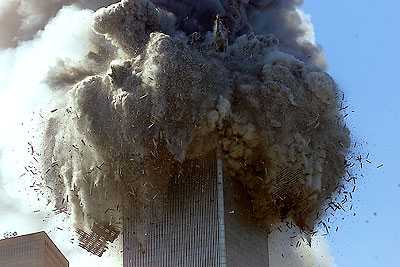
Other top officers at the battered Pentagon made it clear that "ending states who sponsor terrorism" meant wiping out governments that refused to cooperate. Secretary of State Colin L. Powell used language similar to the bellicose phrases he employed in 1991, when he said of Saddam Hussein's army in Kuwait, "First we're going to cut it off, and then we're going to kill it."
Today, Secretary Powell said that once the Bush administration had finished assembling and showing the world evidence against the bin Laden network, "we will go after that group, that network, and those who have harbored, supported and aided that network, to rip the network up."
"When we're through with that network," he continued, "we will continue with a global assault against terrorism in general."
By equating acts of terrorism and even the harboring of terrorists with acts of war, the administration is going well beyond traditional international practice. In this new kind war, it is saying, there are no neutral states and no clear geographical confines. You must choose sides. Us or them. You are either with us or against us.
What the administration appears to have in mind, in fact, is assembling the broadest possible worldwide coalition, as President George Bush did for the Persian Gulf war of 1991, and using it for a different kind of war against a different kind of enemy.
This coalition would then try to strike in a pre-emptive way. By denying sanctuary to terrorists and eliminating them wherever they are, Washington hopes to regain the initiative, which usually lies with the terrorists, because they move in the shadows and can strike at any time.
Achieving this will be more difficult, of course, than winning a conventional war against Iraq. The United States went to war in Cambodia in an effort to deny the Vietcong and North Vietnamese sanctuaries there and failed, even though in that case the geographical area involved was small.
Comment: Bush says we're in for a long fight against terrorism, but he assures us he'll lead us to victory. Let me be the first to suggest a name for this military campaign: Vietnam II.
Invoking classic cowboy language, Bush has said he wants Osama bin Laden "dead or alive." At least Bush, unlike some of his advisors and supporters, has mentioned the possbility of taking Bin Laden alive. Many people want bin Laden dead, so I applaud him for that.
Has anyone started a pool on how long it'll be before Bush declares "victory" and brings the troops home? I mean, after he's destroyed a few installations and killed a few civilians but done no appreciable harm to terrorism? I suspect he'll "defeat" Osama bin Laden the same way his daddy "defeated" Saddam Hussein.
By pressuring the Taliban to turn over Bin Laden, Bush is on the right track. The problem isn't taking action against terrorists, but using language that doesn't match the reality. Bush can't guarantee a total victory or an end to terrorism, so he shouldn't try. It's pointless, even counterproductive, to raise Americans' hopes and then let them down.
Even if we take Bin Laden down, others will continue the jihad. We can shut down a few centers of terrorism, but not them all. Once the body bags start coming home, America's support for its holy war will wither.
One good thing about Bush's self-proclaimed war: If he's preoccupied with terrorism, he can't do anything else stupid. No more tax cuts for the rich, oil drilling in the Arctic, plunging the economy into recession, weakening regulations for arsenic, declaring Superfund sites historic landmarks, etc., etc.
America's old-time rhetoric
Excerpts from a column in the LA Times, 9/16/01:
TERROR'S AFTERMATH
When Words Fail: The Stilted Language of Tragedy
By GEOFFREY NUNBERG
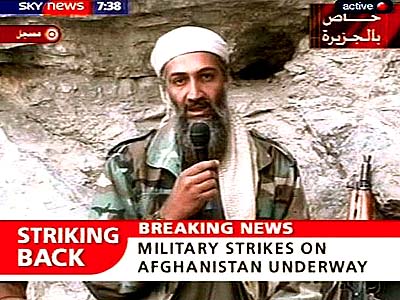
President Bush called the attacks "despicable," which has a primly Victorian sound to it. A TV commentator described the acts as "nefarious," another Gilbert and Sullivan word. And numerous people used the word infamy, which already sounded old-fashioned when President Franklin D. Roosevelt used it in describing the Pearl Harbor attack back in 1941.
You could hear that Victorian note, as well, in the condemnations of the hijackers as "craven" and as "faceless cowards," as if the most damning thing you could say about them is that they behaved dishonorably. Surprise attacks on unarmed civilians are repugnant by any moral standard. But "cowardly" doesn't explain that suicidal fanaticism—indeed we might wish that some of the hijackers had chosen to chicken out when the time came to throw their lives away.
It was all strikingly different from the language we use to condemn other sorts of murderous outrages. The unabomber was demented and the Columbine killings were "senseless"; nobody would have thought of describing either as "infamous" or "dastardly."
Comment: It's hard to demonize a Tim McVeigh-style terrorist when he believes the same thing as you do: government is bad, "freedom" is good, and freedom to bear arms and shoot people is better. Best to save the extreme rhetoric for the swarthy-skinned demons who are obviously "different" from "us."
In the wake of the attacks, though, official America needed something else: language that would reassert control of a world that had gotten terrifyingly out of hand. A high Victorian indignation serves that purpose well. It evokes the moral certainties of a simpler age, when the line between civilization and barbarism was clearly drawn, and powerful nations brooked neither insult nor injury from lesser breeds without the law. This may be the first war of the 21st century, as President Bush has said. But its rhetoric will be taken from the 19th.
Speaking of 19th century rhetoric, Bush upped the ante by declaring not only that the terrorists were evil, but that he would rid the entire world of evil. See Bush to "Rid the World of Evil"? for more on the subject.
How to create a super-villain
An excerpt from the LA Times, 10/5/01:
AFTER THE ATTACK
Fed by Intrigue, the Myth of Bin Laden Grows
The urge to create a super-villain may obscure an understanding of larger issues.
By REED JOHNSON, TIMES STAFF WRITER
As a great world power, America seems to require larger-than-life adversaries. This may be why a brutal but drab bureaucrat like Slobodan Milosevic and a seriocomic opera character like Panamanian strongman Manuel Noriega never fully engaged the national imagination. This country gravitates toward more dramatic, enigmatic figures: deranged would-be prophets like Unabomber Ted Kaczynski, or an inscrutable "mastermind of terror" (as U.S. News & World Report described Bin Laden) who strikes without warning then melts back into the jungle mists or steals away to a remote mountain lair, like a James Bond villain.
Bin Laden isn't the first foreign adversary to inspire this type of obsessive reaction. Mexican revolutionary Francisco "Pancho" Villa, Cuban President Fidel Castro, Iran's Khomeini and, more recently, Col. Moammar Kadafi of Libya and Iraq's President Saddam Hussein all have aroused similar sentiments of fear and loathing. But the dark, often conflicting imagery and loaded descriptive terms surrounding Bin Laden suggest that he has struck several of these archetypal chords simultaneously.
"The closest thing I can think of is, Ho Chi Minh fascinated Americans in the same way," says Klare, referring to the late Vietnamese communist leader. "Here is an individual [Bin Laden], not a government, who has had the audacity to do what governments do, to organize armies and fight major powers. I don't want to give the impression I admire the man—I despise him. But one has to recognize the audaciousness and daring. I think it's a completely unprecedented story."
It's also a story that's being heavily promoted to the American public. In the weeks since the attacks, Bin Laden's hold on the national imagination appears to have grown, not diminished. From coast to coast, he is dissected on op-ed pages and demonized on talk radio.
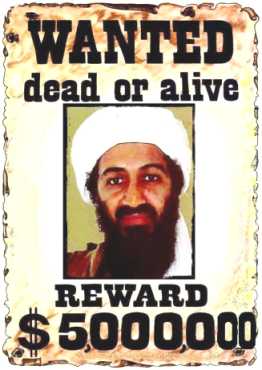
Last week, Bin Laden's doe-eyed visage stared out from the covers of all three major news magazines. Time chose a softly lit head shot. Newsweek opted for a pixilated close-up that transformed his face into a mask of blood. U.S. News & World Report showed his features superimposed over a map of Central Asia, a rifle's cross-hairs framing one eye.
These contrasting but complementary images indicate the potency and flexibility of Bin Laden's expanding myth. Much as the attacks assimilated several of our deepest cultural phobias—our worst-case scenarios of terrorist subterfuge and technology run amok—representations of Bin Laden fuse several legendary bad-guy personas into one frightening composite. In the eyes of much of the Western mass media, he has become a one-man rogue's gallery, a perversion of Joseph Campbell's mythological prototype, the Hero With a Thousand Faces. Bin Laden is the Anti-Hero With a Thousand Faces.
"It plays into a kind of tendency we have in American thinking to see everything as taking place in sort of an eternal present, and to make people into characters in a morality play, instead of real historical beings, whose ideas and personalities and everything else develop in the course of time and in an environment," says Rubenstein. "It's the worst kind of abstraction because it abstracts people from time and place and their environment. So it's a way of masking them. They speak like characters in a Greek play."
It's a play in which Bin Laden has been scripted and typecast for several different roles. President Bush's speechwriters have implicitly linked him to Hitler and Stalin, to "the heirs of all the murderous ideologies of the 20th century." A Sept. 24 story in the Independent, a left-leaning London daily, said Bin Laden "will join the ranks of history's most infamous men," likening him to Chinese communist patriarch Mao Tse-tung and the medieval Mongol warlord Genghis Khan. "The cocktail of genes, nurture, expertise, alienation and opportunity that creates a charismatic but malevolent leader like that occurs once a century, if that," the story read.
Yet just a week earlier, the Independent had run another story, quite different in tone, declaring that, "to many people in the Islamic world," Bin Laden was "a romantic, T.E. Lawrence-type figure, a freedom fighter against the oppressive Soviet invader." The reference was to the fabled Lawrence of Arabia, an Englishman who fought with the Arabs against the oppressive Turkish empire during World War I.
Like Saddam Hussein, another former U.S. ally-turned-enemy, Bin Laden has been compared to Frankenstein's monster, attacking his own creators. A widely circulated e-mail casts him as the evil "Binch" in a parody of Dr. Seuss' "How the Grinch Stole Christmas." ("It could be his turban was screwed on too tight./Or the sun from the desert had beaten too bright.")
Some commentators refer to Bin Laden's "megalomania" (Washington Post). Others describe him as "modest, almost shy" (BBC News), a fragile figure with kidney problems who walks with a cane. A few have compared his charismatic appeal to that of a cult leader, evoking a mesmerizing, modern-day Rasputin ushering brainwashed minions through a high-tech Heaven's Gate.
"The domestic equivalent, I think, would be someone like Charlie Manson: the violence, the drugs, the cult, the fear," says Juliette N. Kayyem, executive director of the program on domestic preparedness at Harvard University's John F. Kennedy School of Government and a former member of the National Commission on Terrorism.
Bin Laden's followers idolize him as the prodigal scion of a Saudi construction magnate, a trust-fund baby so devoted to his cause that he renounced his family's wealth and reportedly now lives like an outlaw, surrounded by his warrior brethren, four wives, multiple children and trusty Kalashnikov rifle. Western pundits are more inclined to see this as a mark of patrician kookiness: Howard Hughes as Holy Warrior.
Occasionally, the characterizations flat-out contradict each other. Some reports say Bin Laden spent his youth in ascetic devotions, his nose buried in the Koran. Others claim he idled it away, drinking and "womanizing" his way through Beirut with other Saudi jet-setters. One British article has described him as "a tall figure with an aristocrat demeanor," while Newsweek writers Rod Nordland and Jeffrey Bartholet find him "soft-spoken, languid in his movements, almost effeminate." Even Bin Laden's height is variously listed as 6 feet 3, 6 feet 4 or 6 feet 6.
A few commentators have imputed godlike powers of omniscience to him, marveling at the attack's precision and the planning it must have entailed. Descriptions of Bin Laden's "elusive" character, the reported 40 attempts made on his life, and his "shadowy" supporters, who are "everywhere and nowhere," have become journalistic commonplaces.
Kayyem thinks that Bin Laden's mythic stature derives in part from his careful stage-management of the Western media. By limiting access, he enhances his personal mystery. "He's never been on a talk show. No one knows what he sounds like. No one's ever really seen him talk, except a few of those journalists. U.S. intelligence lost track of him probably over a year ago, so you're not getting any new information," Kayyem says. "That element of the unknown is kind of fascinating, in an awful way."
Reeve, the British journalist, says he didn't command the resources to interview Bin Laden face to face for his book. Instead, he drew on unpublished reports and interviews with intelligence agents and others. Now he says he can see other Western reporters recycling second-and third-hand accounts of Bin Laden.
"I can find information and comments that've clearly been lifted straight from my book," he says. "There's clearly a reliance on just a few sources of information."
In a way, as Bush told the nation in his speech before Congress two weeks ago, America has seen the likes of Bin Laden before. But the president's allusions to the last century's towering ogres might have been slightly off the mark.
A closer parallel may be Pancho Villa, a onetime U.S. ally who, after a falling-out, led an attack on Columbus, N.M., in March 1916—the first foreign invasion of the United States since the War of 1812. After Villa and his army torched the village and killed 18 U.S. citizens, an outraged President Wilson dispatched 7,000 troops to chase him into the mountains of Chihuahua, Mexico. Airplanes, the newfangled technology of the day, were used to scour the deserts. A British vice consul in Mexico described Villa as "a dog in rabies, a mad mullah, a Malay running amok."
Eighty-five years later, the rhetoric is familiar and the final outcome may well be too. Villa was assassinated, possibly with U.S. help, in 1923.
Copyright 2001 Los Angeles Times

Reactions to the war cries
How did people react to the war cries after 9/11? Here are some examples:
Braided Scoundrel-in-Chief, George Junior, lacking even the sense to be careful what he wished for, has teamed up with a gaggle of fundamentalist Christian clerics like Billy Graham to proclaim a "New Crusade" called "Infinite Justice" aimed at "ridding the world of evil."
They are preparing once again to sally forth for the purpose of roasting brown-skinned children by the scores of thousands. Already, the B-1 bombers and the aircraft carriers and the missile frigates are en route, the airborne divisions are gearing up to go.
To where? Afghanistan?
The Sudan?
Iraq, again (or still)?
How about Grenada (that was fun)?
Any of them or all. It doesn't matter.
The desire to pummel the helpless runs rabid as ever.
Ward Churchill, Some People Push Back: On the Justice of Roosting Chickens
"An eye for an eye" has become our shorthand for the hot satisfactions of revenge. Few of us reflect that when the Hebrew Bible preached that message, it was the first call in recorded human history for restraint, for a proportionate response to violence. None of the Christian radio stations I heard this week dwelt on the other, famous scripture that takes the message to that harder, higher ground.
If Jesus himself had called in this week to ask us to "turn the other cheek," I don't think they would have let him on the air.
Geraldine Brooks, "Rattling Sabers of Bigotry," LA Times, 9/16/01
Given his penchant for contemplating the unexpected, Kesey's e-mail reaction to the absurd terrorist attacks of September is worth considering. His first inclination was to conjure up a distant historical analogy. "Well, I can remember Pearl Harbor," Kesey wrote. "I was only six but that memory is forever smashed into my memory like a bomb into a metal deck. Hate for the Japanese nation still smolders occasionally from the hole. This 9-11 nastiness is different. There is no nation to blame. There are no diving Zeros, no island grabbing armies, no seas filled with battleships and carriers. Just a couple dozen batty guys with box knives and absolute purpose. Dead now. Vaporized."
But when it came to retaliating against the Taliban for the heinous crimes, Kesey turned pacifist. He had been staunchly against the Persian Gulf War and was in full dissent mode when it came to another U.S. war in the Middle East. His literary explorations in human nature had convinced him that an eye for an eye philosophy was bankrupt. "Of course we want their leaders," Kesey wrote, "but I'll be damned if I can see how we're gonna get those leaders by deploying our aircraft carriers and launching our mighty air power so we can begin bombing the crippled orphans in the rocky, leafless, already bombed-out Rubble of Afghanistan." And while 90% of the American people—including me—thought President George W. Bush delivered a superb address to the joint session of Congress on Sept. 20, Kesey, watching from his living room in Pleasant Hill, Ore., shook his head in weary-eyed disgust. "Bush has just finished his big talk to Congress and the men in suits are telling us what the men in uniforms are going to do to the men in turbans if they don't turn over the men in hiding," he lamented. "The talk was planned to prepare us for war. It's going to get messy, everybody ruefully concedes. Nothing will ever be the same, everybody eventually declares. Then why does it all sound so familiar? So cozy and comfortable? Was it the row after row of dark blue suits, broken only by grim clusters of high-ranking uniforms all drizzling ribbons and medals? If everything has changed (as we all knew that it had on that first day) why does it all wear the same old outfits and say the same old words?"
Douglas Brinkley, "A Final Word From the Last Merry Prankster," writing about Ken Kesey, LA Times, 11/18/01
This week, the only late-night host who made waves was Bill Maher, who used his "Politically Incorrect" bully pulpit on Monday to say that the past lobbing of American cruise missiles from 2,000 miles away was cowardly, reacting to a guest who suggested that referring to the terrorists as cowards risked understating their resolve.
LA Times, 9/22/01
What stunningly brutal irony that a personage such as Kissinger should lecture us thusly in the aftermath of the events of Sept. 11; that "half measures [on the part of the United States] are likely to do more harm than good." This from a man who committed so many calculated and devastating acts of terrorism around the world in the name of the United States and who, if we are really going to get serious about addressing the causes and culprits of terrorism, ought now to be arrested and put on trial for his many crimes.
J. Marc McGinnes, letter, LA Times, 9/18/01
Peace in comics but not on agenda
One thing Bush's impossibly overblown rhetoric—aka propaganda—did well in the first week was drown out alternative voices. Some excerpts from an article in the LA Times, 9/18/01:

Concerns Rise That Peace is Not on Table
"This is America acting out its rage," said David Robinson, executive director of Pax Christi USA, a Roman Catholic antiwar group. "We have to hold ourselves back, lest we ourselves become the barbarians who started this in the first place."
"Everyone has just crumbled," said Mary Lord, a Washington-based lobbyist for the American Friends Service Committee, a Quaker group.
"Often we counsel other nations that they need to stop and reflect," Lord said. "We've said that to people in Northern Ireland and the Middle East, and now we have to say it to ourselves."
Bill Warrick, a spokesman for the Gainesville, Fla., chapter of Veterans For Peace, said Americans need to put themselves in the shoes of their attackers.
"What we should do is get into the minds of the people who did it: Why do these Middle Easterners hate us so much?" said Warrick, an Army veteran who turned against violence during his service in the Vietnam War.
In Southern California, home to many of the victims killed in Tuesday's plane crashes, the local Human Rights Watch office has been deluged with calls from people concerned that retaliation equals more dead civilians, albeit in another country.
"There's this expectation that there will be a Hollywood-style military strike and we'll be dropping missiles, and it will feel satisfying," said Emma Cherniavsky, associate director of the branch office. "I find that a very terrifying image. That would mean losing more lives."
Critics denounce Bush's bad language
From the letters to the LA Times, 9/21/01:
Bin Laden sells his ideology to poor, young, ill-educated Muslims by telling them the West is out to destroy Islam. Then President Bush, who one would think would want all moderate and clear-thinking Muslims to be sympathetic to our side, calls his plan to get the terrorists a "crusade."
This is maybe the very thing that Muslims remember and fear the most about the West: the Crusades. Was this a deliberate jab on his part, or just another one of his blunders with words?
TIM METCALFE
Los Angeles
From the LA Times, 9/22/01:
THE PRESIDENTIAL ADDRESS
Bush Conveys U.S. Emotions to the World
Reaction: International political observers generally praise his address, though some see 'arrogance' in his us-or-them view.
By MARJORIE MILLER, TIMES STAFF WRITER
LONDON — President George W. Bush's rousing speech to Congress won high praise abroad for articulating the sentiments of his aggrieved nation and for issuing an ultimatum to Afghanistan to surrender those believed responsible for the terror attacks on New York and the Pentagon.
Like British Prime Minister Tony Blair, who sat next to First Lady Laura Bush during the speech, many governments renewed vows of support Friday for the U.S. drive for justice.
In Moscow, Russian President Vladimir V. Putin seemed moved to action, responding with the strongest signal yet that his country would not sit on the sidelines of a "war on terrorism." Allies applauded—and echoed—Bush's assertion that the war is not between the West and Islam, but there also was much criticism of his "arrogance" in admonishing the world that "either you are with us, or you are with the terrorists."
Several political observers said the us-or-them policy is unrealistic and unsustainable.
"He wanted to divide the world into black or white, but there are a lot of gray people in the middle who don't want a military solution," said Ryuhei Hatsuse, professor of international relations at Kobe University in Japan.
"When [the United States] says that the fight is between good and evil, they go way too far," said Vladimir P. Lukin, vice speaker of Russia's lower house of parliament and a former ambassador to the United States. "Such rhetoric suggests they have usurped the power of the Almighty on Earth."
What might inspire the troops ahead of a military campaign "is not going to be borne out over time," said British political commentator Hugo Young of the Guardian newspaper. What happens, he asked, when a friendly country such as Egypt gets cold feet about a prolonged U.S.-led military campaign with Muslim civilian casualties? "Are they really going to be deemed an enemy of America?"
Many commentators lauded Bush's most effective performance to date. He did not have to rally U.S. opinion, which was already united in grief and anger, but he had to express it, and that he did extremely well, they said. Several political analysts compared his firmness of purpose to that of President Franklin D. Roosevelt in his "day of infamy" speech after the bombing of Pearl Harbor.
"This was a speech of a world leader," said Polish political analyst Jerzy Marek Nowakowski. "The president of the United States clearly stated that America is ready to take upon itself the responsibility of leadership of the free world."
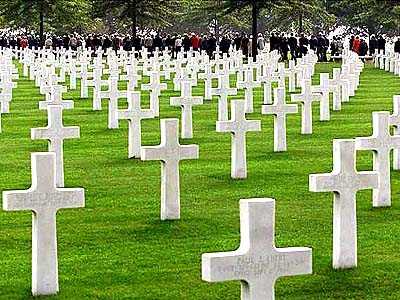
Bush "came storming out of his shell like a commander leading his troops onto the equivalent of D-day's Omaha Beach," London's Evening Standard newspaper reported on its front page Friday.
But here, too, accolades came with a warning.
"We shall discover in days ahead whether American-led military action takes the limited form favored by Britain and other allies, or proves more ambitious and destructive, as administration hawks would like," the paper said in an editorial. "If airstrikes and special forces raids are confined to carefully-chosen terrorist targets, Britain will remain firmly in step with the U.S. Concord with Washington would look more fragile if military action resulted in large-scale civilian casualties, in Afghanistan or anywhere else."
In his speech, Bush asked for the help of the world's police forces, intelligence services and banking systems to track down chief suspect Osama bin Laden and break his Al Qaeda organization. But the president left room for different countries to contribute to the campaign according to their political abilities—with differing levels of military, intelligence and moral support.
Japan's Constitution, for example, bans all but defensive military actions. Mexicans have expressed sympathy for the victims of the Sept. 11 terrorist attacks but remain committed to their country's traditional neutrality in any armed conflict. In a poll published in Milenio newspaper Friday, 77% of respondents said Mexico should stay on the sidelines in any war.
"Mexico has always closed ranks with the United States and is willing to cooperate, but only in a diplomatic and political sense," said Ana Covarrubias Velasco, an international relations researcher at El Colegio de Mexico in Mexico City.
Across the globe, there were few official responses to Bush's appeal, which came overnight for Europe and the Middle East and at the start of the weekend for the Muslim world.
Putin was the most forthcoming.
"We are ready to cooperate with the U.S. in fighting terrorism in the widest possible sense," Putin said in an interview with the German ARD network Friday night. "We have not received any specific requests as of yet, but the special services have been cooperating for a long time already. The question is how to bring this cooperation to a qualitatively new level. We are ready to do that."
Russian backing is critical if the U.S. military campaign is to win support from Afghanistan's northern neighbors in the Central Asian states of Uzbekistan, Turkmenistan and Tajikistan. Russia also maintains strong ties with Iran, which borders western Afghanistan.
Iranian President Mohammad Khatami has condemned last week's attacks, but Tehran's support for retaliation is uncertain.
At Friday prayer, one of the nation's most prominent, conservative clergymen talked of the need to combat terrorism but cautioned against a hasty response by the United States.
"Terrorism is intrinsically condemned, and all the world has condemned the recent attacks. But one should not act hastily to fight terrorism," said Ayatollah Mohammad Yazdi. "The international fight against terrorism should be well thought out, reasoned and directed at identifying and eradicating terrorism."
At an emergency meeting in Brussels, European Union foreign policy chief Javier Solana backed Bush's appeal to moderate Muslims.
"President Bush said very clearly that this is not a crusade or a battle against civilization, against Islam or the Arab countries. On the contrary, we would like very much to have those countries together with us on this battle, this combat against terrorism," Solana said.
Although abandoning his earlier "crusade" language won Bush some praise, many Muslims and Arabs remained unconvinced.
"The Muslim people are united," hard-line cleric Mussa abu Sweilem roared through a loudspeaker in downtown Amman, the capital of Jordan, a U.S. ally in the Mideast. "They must stand by each other and support each other at all times."
Israeli Prime Minister Ariel Sharon reiterated that his country was standing by the American people, while Hafez Barghouti, editor of the official newspaper of the Palestinian Authority, Al Hayat al Jadida, said many Palestinians fear that the Bush administration will try to lump them with Bin Laden.
"Until now, the Americans are [only] speaking about the terrorists who attacked them. They haven't mentioned the Israeli occupation or the state terrorism that Israel uses against us," Barghouti said.
Abdel Bari Atwan, editor of the London-based pan-Arab daily Al Quds al Arabi, criticized Bush's obliteration of any middle ground in the war on terror.
"It was an arrogant speech. Americans are always telling us things are not black and white, that there are always grays. When we learn this from them, they say, no, you are either in or out, with us or against us. I am not allowed to use 'buts,' " Atwan said.
An appeal for justice and peace came from one African victim of terrorism. Douglas Sidialo is a former marketing manager who was blinded during the 1998 bombing of the U.S. Embassy in Nairobi, Kenya, that was also attributed to Bin Laden's organization.
"It was a moving, powerful and important speech," Sidialo wrote in an e-mail to The Times. "I was impressed by his advice to the American people to show calm. . . . It is my hope that he would equally exercise wisdom, caution, patience, restraint, and not retaliate."
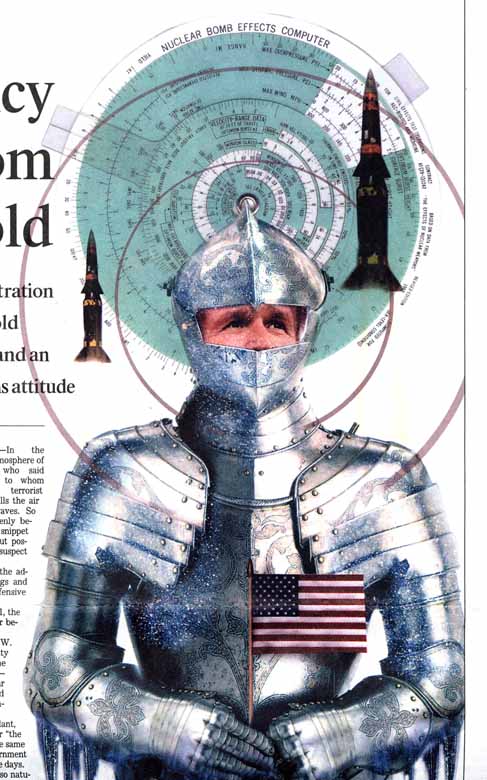
Sidialo, who helped form an organization to aid Kenyan survivors of the bombing, appealed to Islamic leaders to surrender the accused and "save us from this looming war."
Copyright 2001 Los Angeles Times
From a review of Gore Vidal's book on 9/11, Perpetual War for Perpetual Peace: How We Got to Be So Hated. In the LA Times, 5/12/02:
...[T]he rightful shock and trauma experienced by the American people on Sept. 11, he says, must be viewed and experienced in the broader context of what our nation's behavior has been toward the rest of the world. When President Bush, masterfully demeaned by Vidal as a "sill-billy," proclaims you are either with us or against us, Vidal responds: "That's known as asking for it."
Excerpts from a FAIR Media Beat article, 9/28/01:
The "Wimp" Factor: Goading to Shed Blood
By Norman Solomon
In recent weeks, since the events of Sept. 11, countless reporters and pundits have hailed George W. Bush for laying to rest any doubts as to his own command of the presidency. Bush's address to a joint session of Congress was pivotal in recasting him as a consummate national leader.
Few journalists have been intemperate enough to emphasize that greatness involves much more than doing an excellent job of reading a finely crafted text on a TelePrompTer. The circumstances were truly extraordinary, but the dynamic was essentially formulaic. Presidents have customarily earned rapturous media kudos by brandishing America's military arsenal against evildoers.
If we can remove the red-white-and-blue tint from our media lenses, President Bush's rhetoric is likely to give more reason for trepidation than comfort. The world is filled with national leaders, and religious true believers, who assert that their country or exact faith is the locus of everything good—and foes are the incarnation of evil that must be wiped from the face of the Earth.
"The problem is that America wants its own version of justice, a concept rooted, it seems, in the Wild West and Hollywood's version of the Second World War," longtime foreign correspondent Robert Fisk wrote in Britain's daily Independent newspaper. "President Bush speaks of smoking them out, of the old posters that once graced Dodge City: 'Wanted, Dead or Alive.'" Such presidential verbiage plays to a U.S. media gallery that is way too easily pleased by grand pledges to avenge horrendous slaughter by—in effect—escalating a cycle of violence.
President George W. Bush need not fear that a national magazine will emblazon him with the wrong "W." He is not a wimp. But, as president of our beloved country, what is he? And who are we?
Such questions may seem unduly abstract and theoretical at a time of grave crisis. But what better time could there be to search our souls? Terrible crimes against humanity were committed on Sept. 11. Every person who died as a result, in Manhattan and Virginia and Pennsylvania, was martyred by ultra-righteous and murderous madness. How easy—how incontrovertible—it is to recognize and condemn such madness when it strikes at our own country. How much more difficult it is to recognize when our own country brings deadly violence down on others. The world already has too many martyrs.
Bush finally "gets" it...
From the LA Times, 9/27/01:
Bush recently apologized for saying he was on a "crusade" against terrorism—a word that harkens back to the Christian wars centuries ago to retake the holy land from Muslims. And the United States changed the name of its military operation from "Infinite Justice" to "Enduring Freedom," recognizing that in Islam only God can provide infinite justice.
Dubya didn't come to these realizations himself, of course. Nor did his legions of supposedly wise advisers help him out. No, it took a meeting with 15 American Muslim leaders to turn the tide. From the LA Times, 10/29/01:
During the Sept. 26 meeting, discussion touched on the need to protect the civil rights of Muslims in the wake of the attacks, and the importance of avoiding insensitive terms when describing U.S. retaliation, said Hathout. "Muslim" need not describe "terrorist," they advised. And "crusade," which was used by the president to describe the U.S. response to terrorism, they pointed out, has a negative connotation for Muslims.
Hathout said the meeting had immediate results. Not only did the language of public statements change, he said, but "we noticed a drop in hate crimes after that."
...or not
I wrote the following letters to the LA Times, 9/26/01:
Bush Breaks Promise on Vengeance
Colin Powell is saying we may not topple the Taliban regime after all—may even aid it if it turns over Bin Laden and his followers. What happened to Bush's "you're either with us or against us" talk and his promises to punish those who harbored terrorists—namely, the Taliban? I guess what Bush meant was, "You're either with us or against us—unless you cooperate a little, in which case we'll forgive you for harboring the terrorists who killed 3,000 Americans."
*****
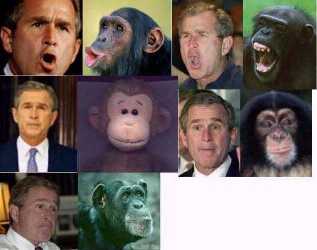
Bush's Rollercoaster Rhetoric
In two weeks we've gone from a targeted campaign against the people who actually attacked America to a "war on terrorism" to a "crusade" to "Infinite Justice" to "ridding the world of evil." The only thing Bush forgot to promise was God's kingdom on earth. Perhaps he's saving that for his second term.
Having reached the crest of fairy-tale rhetoric, we've ridden the wave back down to reality. Now we're back where we started, with a targeted campaign against the people who actually attacked America. Great...but in getting there, Bush has frightened half the world with his comic book-style saber-rattling.
In two weeks, Bush has topped every previous president for most pledges made and abandoned. Now that Colin Powell seems to be in charge, isn't it time for another of Bush's month-long vacations? Maybe Dubya should take two or three months off this time.
Sadly, the rollercoaster ride didn't end after the initial loop-the-loop. For instance, from the LA Times, 10/12/01:
Speaking at his first White House news conference since the Sept. 11 terrorist attacks, and the first prime-time news conference of his presidency, Bush first referred to the wealthy exiled Saudi—believed by U.S. officials to be the mastermind behind nearly a decade of attacks on the United States and U.S. interests overseas—as "Mr. Bin Laden." But eventually he used a biblical construction for Satan, referring to him as "the evil one."
See Dubya-Speak: Justice Means Killing People for more on the subject.
More on killing Muslims
Landham calls for genocide
Related links
Terrorism: "good" vs. "evil"
Winning through nonviolence
America's cultural mindset
* More opinions *
|
|
. . .
|

|
Home |
Contents |
Photos |
News |
Reviews |
Store |
Forum |
ICI |
Educators |
Fans |
Contests |
Help |
FAQ |
Info
All material © copyright its original owners, except where noted.
Original text and pictures © copyright 2007 by Robert Schmidt.
Copyrighted material is posted under the Fair Use provision of the Copyright Act,
which allows copying for nonprofit educational uses including criticism and commentary.
Comments sent to the publisher become the property of Blue Corn Comics
and may be used in other postings without permission.













